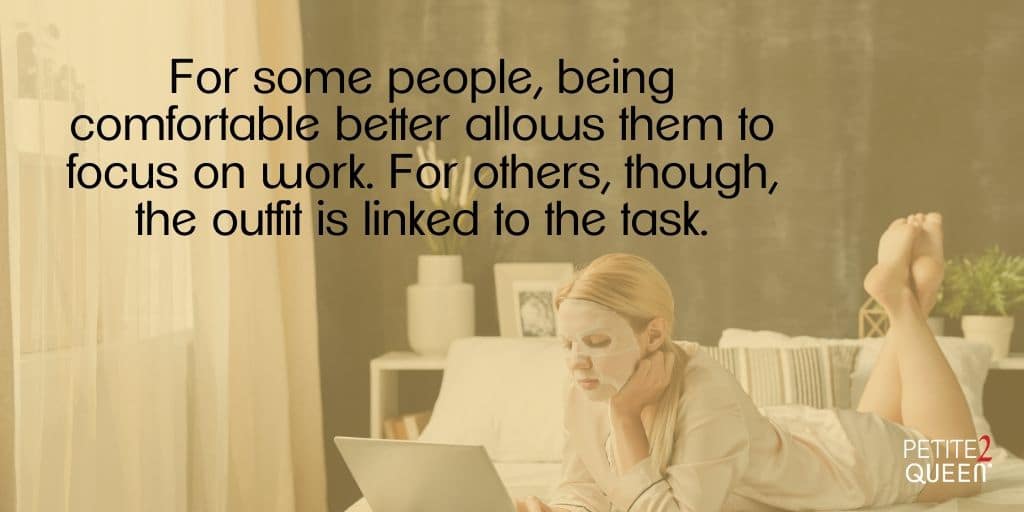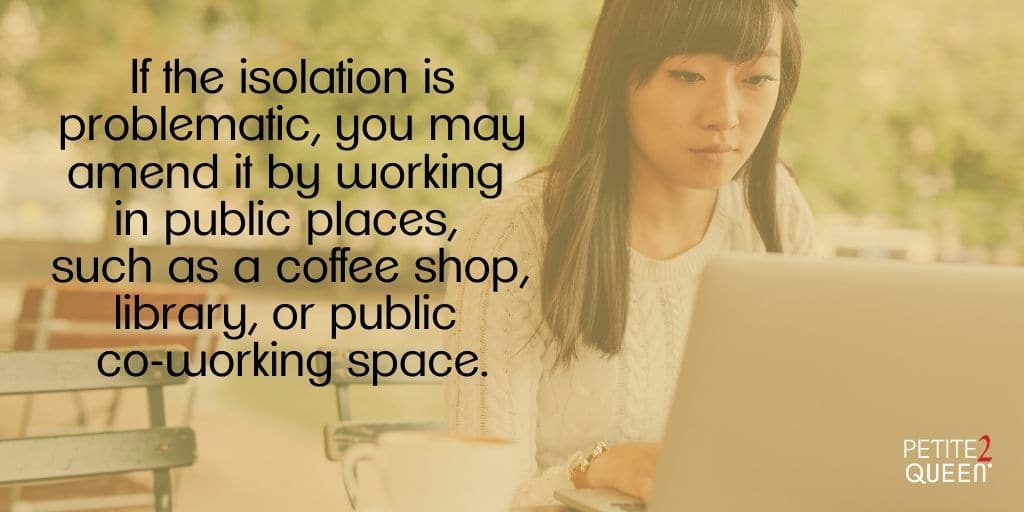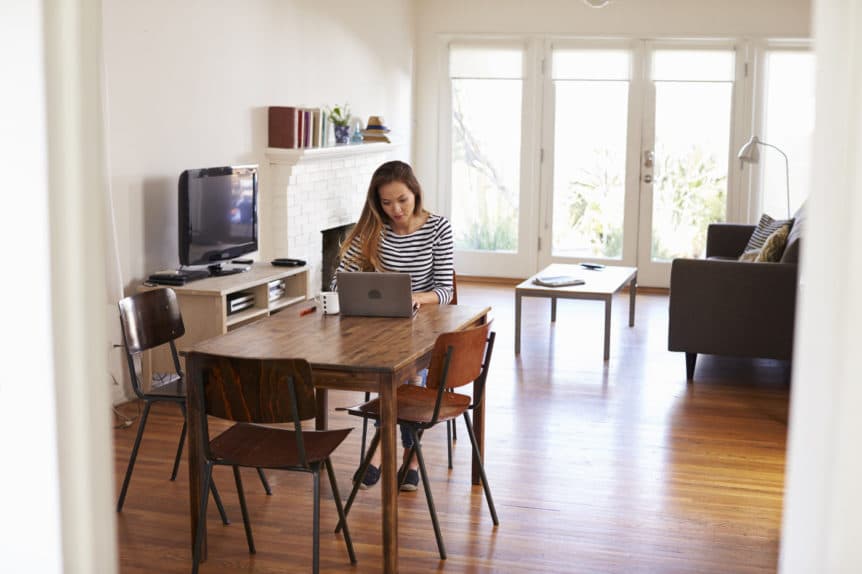Do you dream about being able to work from home? When that rush hour commute and distracting, endless office chitchat start to wear you down, it’s easy to see why so many people love telecommuting. In fact, the number of workers telecommuting has more than doubled in the last decade; now, 43% of Americans work from home at least some of the time, and the amount of time spent doing so has steadily risen. It’s increasingly easy to work from home, depending on the industry and position. As more businesses embrace the option, many of us will have the opportunity to telecommute part or all of the time.
I’ve primarily worked from home in the past 5 years, and I love it. It’s exactly the type of work environment that allows me to thrive. But for a close friend of mine, working from home has been a challenge. It’s just not the right fit for her.
As lovely as working from home sounds, have you considered whether you’re a good fit for it? While many people love to telecommute, others actually prefer doing their jobs onsite. How do you determine whether working from home is right for you? Here are some questions you can ask yourself.
1. Are you good at motivating yourself, or do you work best with more structure?
Some people are adept at developing to-do lists and sticking to them. They are able to concentrate on their work unsupervised and meet deadlines. They work efficiently and place the necessary discipline they need on themselves in order to complete their tasks.
On the other hand, some people perform best with an enforced schedule and supervision. Being around other workers gives them the motivation they need to focus. While isolation can be distracting and lead to procrastination, working in an office provides the right setting to get into work mode.

2. Do you work better alone or with others?
Many people do their best work in groups. They feed off each other’s energy and it helps to bounce ideas off one another. Being with others is energizing, motivating, and helpful to getting those creative juices flowing. If you’re an extrovert, you may prefer being around other people while you work.
Meanwhile, there are just as many workers who are most efficient working solo. A quiet place to think and zero in on the task leads to better output. You may find other people distracting, or simply a hindrance to your creativity and sharpness. Introverts especially may be happiest working in a quiet location away from others.
3. Do you crave more freedom with your schedule? Or do you like the structure traditional workplaces offer?
Some people work well within the standard 9-5 job schedule. There’s a predictable rhythm to your workday, and the routine is both comforting and helpful in keeping you on track. If you’re happy with traditional onsite work structures and schedules, telecommuting can be jarring at first.
Alternately, you might want more freedom and flexibility in your schedule. It might sound convenient to be able to split your day into two parts, with a gym run in the middle. Or perhaps telecommuting affords you the flexibility to run some errands during the day. However, keep in mind that not all telecommuting positions offer such flexibility. Many employers will expect you to maintain regular business hours.
If this sounds great, just ask yourself: Are you able to organize your schedule in a way that allows enough time for your job? You know what Spiderman said: With great power comes great responsibility. If you’re going to have this freedom, make sure you know what to do with it. Don’t cut your work time too short, but don’t go to the other extreme and become a workaholic. Especially when you’re not paid by the hour, it can be difficult to maintain regular hours. Be mindful of your schedule.

4. How do you feel about your daily commute, wearing office clothing, and other minor differences between your home and onsite office?
Finally, consider the smaller aspects of working from home vs. at the office. If you telecommute, you’ll rarely have to sit in rush hour traffic; you probably don’t even need to leave your house. How is the commute to your current job? Is it horrible, tolerable, or actually enjoyable? Some people like the commute, as it gives them time to mentally switch into work mode. It can be a chance to relax, listen to music or a podcast, and prepare for the workday. Conversely, on the way home, it can give you time to unwind and switch gears again. Working from home, you might not have that limbo time unless you decide to carve it out for yourself.
Clothing is another big thing to consider. When you work from home, you can be in your pajamas all day. For some people, being comfortable better allows them to focus on work. For others, though, the outfit is linked to the task. Being in sweats might leave them in a less-focused, too-relaxed state of mind. If that sounds like you, it might help to put on professional clothing anyway. It can be just the trick to get your mind into work mode. However, if you work at the office, you will need to dress according to workplace guidelines. If you are satisfied with your office wardrobe, this may not be an issue. But if you dislike the dress code and feel uncomfortable, you might be happier in a more relaxed environment… like your home office.
Take these and other minor aspects into consideration. Are you satisfied with the finer details of working onsite? Or are there certain things you’d be happier with in a home office? Be honest with yourself as you weigh the pros and cons of both sides.
So, Should You Start Working From Home?
These are just some of the things you should consider before you dive into a telecommuting position. For some, working from home brings out the best and allows them to work efficiently while achieving the right work-life balance. It can be great for people who do creative work or don’t need to interact with others much to do their jobs. For others, telecommuting can leave you lonely, distracted, and unmotivated. If you thrive when you’re surrounded by people – or, in fact, need to work with others for your job – onsite positions may be best.
If you run into difficulties with your home office position, you may be able to adjust your approach or schedule. It may simply be a skill you need to develop. However, if the isolation is problematic, you may amend it by working in public places, such as a coffee shop, library, or public co-working space. Alternately, you may want to talk with your supervisor about doing more work onsite. Be open to what works best for you, and don’t be afraid to make a change in your working environment. Talk to your supervisor about your options. You may end up in a more natural working condition because of it.
Resources
- Article: “Everything You Need To Know To Set Up An Ergonomic Home Office”
- Article: “How Did the Pandemic Change Our Offices?”

Amanda Whitbeck is Vice President of Operations at Petite2Queen. Since earning her master’s degree in Global Entertainment & Music Business from Berklee College of Music, Amanda has played key roles facilitating growth at start-ups. She’s also worked in diverse sectors of the music industry, from live events promotion to entertainment journalism. She brings her expertise in music business, writing, and website development to Petite2Queen.

